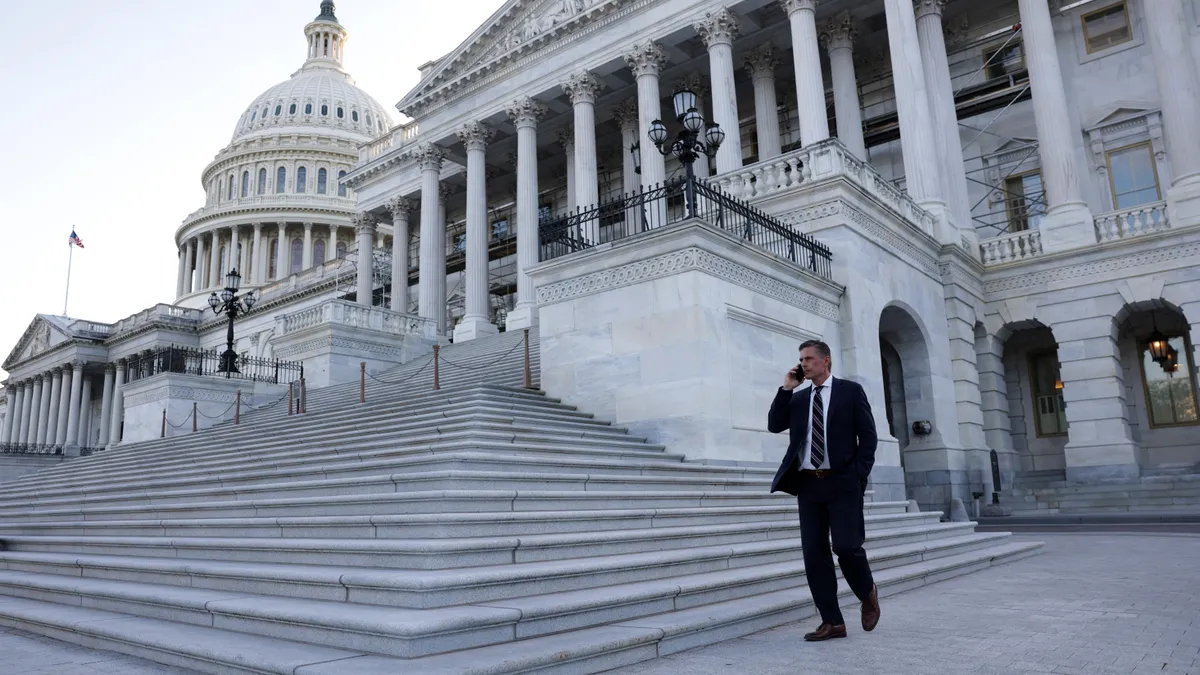The earliest stories stemming from negotiations of the 2023 National Defense Authorization Act (NDAA) centered around what wasn’t included. Namely, the seemingly perennial SAFE Banking Act, aimed at protecting financial institutions that provide services to legal cannabis businesses, again failed to make the cut in the Senate version of the defense bill.
But what of other banking-related provisions that did make it?
The Fair Hiring in Banking Act, included in the version of the NDAA that passed the House on Thursday, would allow people with criminal records to work for a Federal Deposit Insurance Corp. (FDIC)-insured bank seven years after their conviction or five years after their release. People who committed offenses before age 21 can work at an FDIC-insured bank 30 months after their conviction, according to the legislation.
Greg Baer, CEO of the Bank Policy Institute (BPI), cheered its inclusion.
“This legislation will give Americans with minor records a clear pathway to stable, good-paying jobs in the banking industry and a second chance to realize their potential,” Baer said in a statement Thursday. “Not only will these candidates gain access to new opportunities, but our nation’s banks and our economy will also benefit from the skills of this untapped pool of talent.”
Some banks have instituted policies making it easier for second-chance workers to get hired. JPMorgan Chase years ago removed all questions about criminal backgrounds from job applications and established a policy center to help former criminals find jobs.
It expanded its effort to help ex-offenders return to the workforce last year, partnering with nonprofits to connect people with arrest or conviction histories to in-demand jobs. CEO Jamie Dimon also agreed to co-chair the Second Chance Business Coalition encompassing 29 member companies.
The bank hired 4,300 people with criminal records last year, Nan Gibson, executive director for public policy and corporate responsibility at the JPMorgan Chase Policy Center, told American Banker. That’s more than double the bank’s 2,100 second-chance hires from 2020.
Neobanks, too, have responded to what they see as an opportunity with ex-offenders. A husband-and-wife team this year launched Stretch, aimed at providing banking services to individuals impacted by incarceration.
The Fair Hiring in Banking Act furthers a move by the FDIC in 2020 that allowed people convicted of "de minimis" crimes or those who had their convictions vacated or expunged to bypass the agency’s waiver process.
Another provision that made the House-passed NDAA would require the Federal Reserve to create and maintain a public, online, searchable database. That list, to be updated quarterly, would not only detail which banks have Fed master accounts, but also companies that have applied.
The master account process came under fire from a number of angles this year. At a nomination hearing for Sarah Bloom Raskin, a former candidate to serve as the Fed’s vice chair for supervision, Sen. Cynthia Lummis, R-WY, asked Raskin whether she used her standing as a former Fed governor to help the fintech Reserve Trust — where she served on the board of directors — gain a master account with the central bank. The master account allows companies to move money through the Fed system without using a bank. At the time, Reserve Trust was the only fintech to have one.
Sen. Pat Toomey, R-PA, then wrote Kansas City Fed President Esther George, who approved Reserve Trust’s master account. Toomey wanted George to provide him with information detailing why Reserve Trust was given one. George refused, citing confidentiality concerns surrounding company information.
The Fed in August finalized a tiered set of guidelines it uses to review requests for access to master accounts. The central bank last month sought public comment on a proposal to periodically publish a list of institutions with access to master accounts.
Toomey last month called the move “a step in the right direction,” but upped the ante, authoring the NDAA provision seeking a public database. The Fed’s proposal would not include information on rejected requests for master accounts. The Toomey provision does.
“Events and information gleaned over the last year have raised significant policy questions about the Fed’s approach to awarding master accounts,” Toomey wrote in a statement Thursday. “Access to the Fed’s payment system is a highly valuable public good, and Congress has a responsibility to taxpayers to ensure regulators give out public goods in a fair and consistent manner.”
Crypto-focused Custodia Bank sued the Fed in June over what it argues is an unreasonable delay in its request for master account access — especially in light of approvals the central bank granted BNY Mellon.
Toomey on Thursday said his provision “will provide the American people with the information about master account applications that they deserve, but which the Fed has refused to provide.”
“The Fed and other regulators need to know that if they won’t be transparent, Congress will hold them accountable,” Toomey said.



















